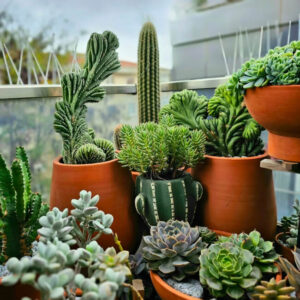Bamboo Screening is a great way to add texture to fences, as well as adding often needed privacy to your private oasis. Using bamboo for privacy is a cheap and effective way of blocking out neighbouring windows and traffic noise, while still letting gentle filtered light through the bamboo lattice.
It’s also a simple way to create space for climbing plants which only makes them more attractive. In this article, I want to share some ideas, and some guidance based on my own garden, which backs on to a public footpath, and a small block of retirement flats.
While I don’t begrudge our local pensioners their views into our garden (we specifically hang bird feeders in the tree closest to the flats because we know they enjoy watching the local wildlife), the sense of security added by the bamboo privacy screen when we go about our daily chores is always nice.
More...
Best Value

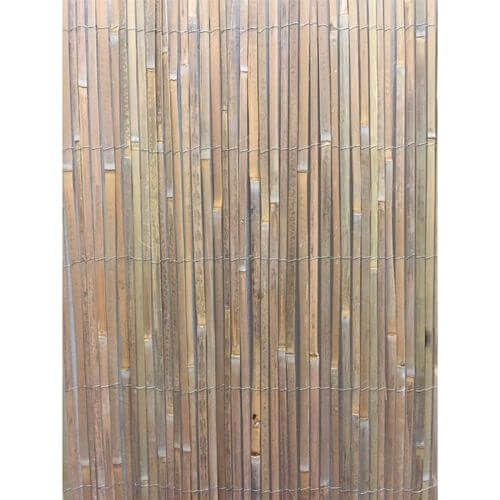
Best Bamboo Screening for 2025
Choosing the right bamboo screening for your garden is essential. Bamboo comes in all sorts of colours and widths, meaning you can really tailor your screen to the plants in your garden, or match it to the tone of your other fences for more subtle screens.
The other major consideration is cost. In the next few sections I’ll try to break down the varieties of bamboo, the types of screening, and how to install them for maximum impact and security.
Types of Bamboo Screening
First, let’s get to grips with the different types of bamboo screening. There are four major variations in bamboo screening; planed bamboo; whole bamboo; bamboo trellis; expanding bamboo trellis.
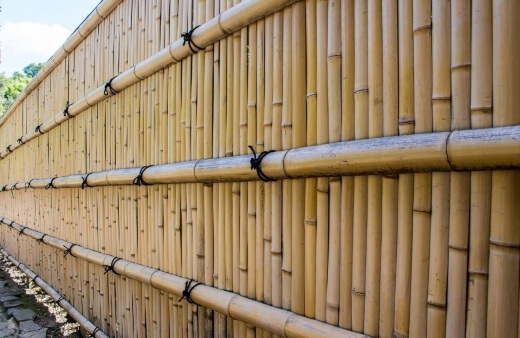
- Planed bamboo is the best money saving option, as for every bamboo stem harvested for manufacturing the fence, you get around 3cm of fence.
- With whole bamboo using young shoots, every stem harvested will make around 1cm of fence. Both options are usually fairly cheap, but the coat can vary greatly depending on the thickness of bamboo.
But what you’re willing to pay makes a huge difference in the impact the fence will have on your garden. - Bamboo trellis is a great money saving option, usually supplied with thicker stems for more durable bamboo screening, but also for a higher impact – especially in gardens that are trying to achieve an oriental look.
Trellis needs proper installation though as it won’t hold up to the wind in the same way as screening. - The cheapest option by far is expanding bamboo trellis, which won’t give you instant impact, but is a great money saving way to install a bamboo privacy screen, as long as you’re willing to wait for plants to grow through it.
How to Choose the Best Quality Bamboo Screening
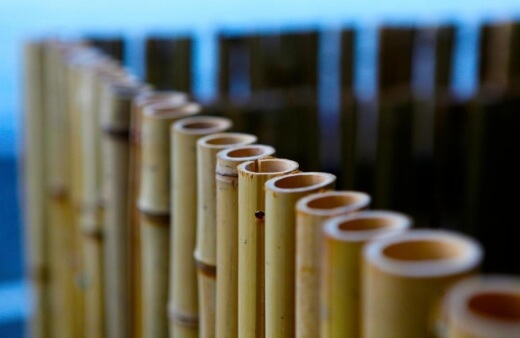
Black bamboo, red bamboo and yellow bamboo are all durable enough to withstand wind, the weight of plants and the occasional football being kicked at them.
I prefer black bamboo for the contemporary darkness it adds to the back of our garden (traditionally, white was said to make gardens seem bigger, but black creates an endlessness to spaces, particularly when the colour comes from natural materials.
The best measure of the quality of bamboo screening is the thickness of each stem in the screen. Planed bamboo is the weakest, so for fences that need added security, always spend a bit more and go for the thicker bamboo screening.
Using Bamboo for Privacy
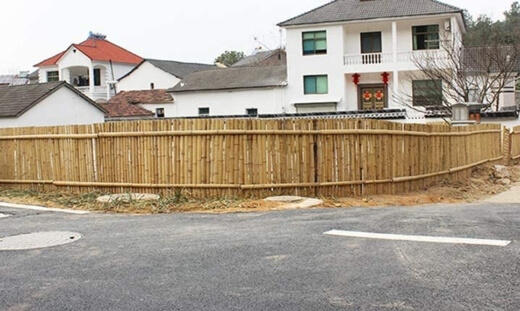
Creating a bamboo privacy screen is a great way to block out nosey neighbours without upsetting them. The great benefit of cheap bamboo screens is that they are lightweight, so depending on planning permissions in your part of Australia, can be attached to the fence to add extra height.
The other option, where you don’t already have a fence in place, is to install fence posts, and use wire to attach them around your garden boundary. Creating this kind of bamboo fence screening is a great way to boost privacy, but keep light coming into the garden.
Using Bamboo for Climbing Plants
Bamboo trellis, particularly the adaptable expanding bamboo trellis is a wonderful natural way to add height to the garden, but for long lengths of fence, adding a normal bamboo privacy screen can do the same job.
Plants like Virginia Creeper will crawl through the gaps between the bamboo and grow into a dense crimson mat along your fence with no need to train them at all.
Because of the way most bamboo screen is built, there are loads of wires to tie twine to, if you want to grow roses or high maintenance climbers to your bamboo fence.


Get Your Free Guide:
Master Growing Australian Natives eBook
A Must Have Complete Guide for Every Australian Garden
Get Your Free Guide:
Master Growing Australian Natives eBook
A Must Have Complete Guide for Every Australian Garden
How to Install Bamboo Screening
Depending on where you are putting it, there are three really easy ways to install bamboo screening.
Installing Bamboo Fence Screening or Bamboo Trellis
If you are attaching to an existing fence or post, simply roll the screen out along the fence (being careful not to damage any plants in the border in front of the fence), and use garden wire, or galvanised steel wire to tie the bamboo privacy screen to the fence. This gives your garden an instant facelift without any tools.
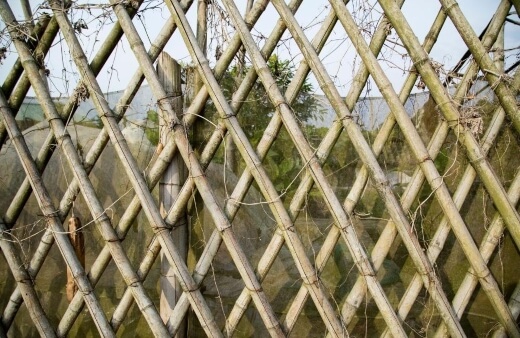
Installing Bamboo Privacy Screen
If you want to add height to existing fences, then installation is the same as above, but along each fence panel, secure a tanalised or treated length of timber (the same width as your fence) horizontally around 1m below the top of the fence.
Roll out the bamboo screen along the fence, and with someone to help you, lift it onto the batten. Then all you need to do is tie it to the batten at the bottom, and put some screws at the top of the fence so you have something to tie to at the top.
This is the method we’ve used in our own garden and it has lasted years.
Installing a Bamboo Fence
To install a self-standing bamboo fence, choose a thick bamboo that can hold up to pressure and won’t sag. First, bury fence posts the same height as your bamboo screen, and set them in fast drying concrete (always use a spirit level).
One they have set in place, just screw or tie the fence panel to the posts (most concrete is fully set in 1 hour in warm weather).
Bamboo Screening Reviews
We are currently reviewing new models and will update this post shortly.
1. Eden Bamboo Screening

Eden Bamboo Screening, sold exclusively at Bunnings, is made from 100% renewable materials by a trusted brand. It’s the best value option in our review selection too, covering a huge 1.8m height, by 3m across.
Pros
Cons
Bamboo Screening FAQs
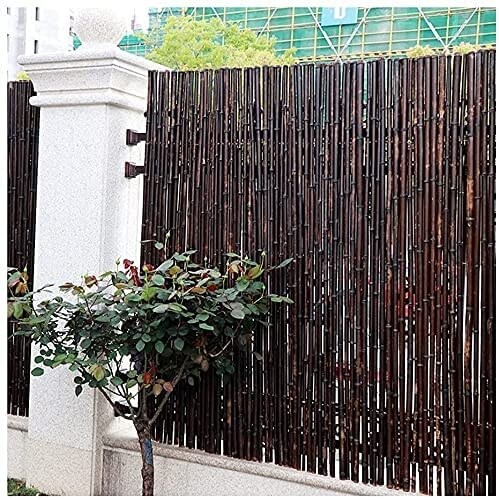
Is Bamboo screening sustainable?
Yes, bamboo screening is a very sustainable product. So much so that most sustainable gardening uses this type of screening. In fact, many kitchen and homeware manufacturers have begun using bamboo ply as a replacement for harvested timber as bamboo requires no reseeding.
And, if allowed to grow to maturity, will regrow within a few years once harvested, actually benefiting the environment in the process. Bamboo screen is even more sustainable, given the reduced manufacturing processes involved in its production.
What is bamboo?
Bamboo is a giant grass which originated in china. While it will grow anywhere in the world, it can be an incredibly invasive plant, so if you ever consider growing a bamboo hedge, make sure to look for clumping bamboo.
How long will bamboo screen last?
A well-made bamboo screen will last at least 15-20 years, and you can prolong its lifetime with timber care products specifically manufactured for bamboo.
Install the Best Bamboo Screening For Your Home
Personally, I prefer bamboo screening to standard fence panels. It looks more natural, and lasts longer and most bamboo screening costs less per metre of fence than purpose made fence panels.
There are more types of fencing for anyone worried about how bamboo looks, as it can accidentally change the look of a garden, particularly if you’re aiming for a cottage style garden or an Australian prairie garden, in which case willow screening or wicker screening might be better for you.
Either way, the tips in this article for how to install bamboo fencing, and the differences between bamboo privacy screening, bamboo trellis, bamboo fencing, and bamboo fence screening should serve as useful whatever materials you use to build your new privacy bamboo screening.

Published on December 14, 2021 by Gary Clarke
Last Updated on December 23, 2025

